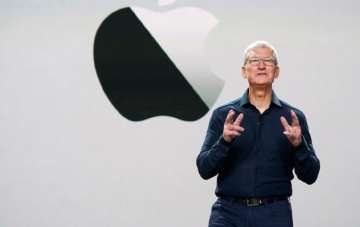Apple CEO Tim Cook, whose real-time net worth is about $1.4 billion, shot down rumours that Apple is targeting crypto as an investment even as prices for bitcoin and ethereum soared to new record highs. He said Apple has been looking at crypto, but might not offer users a way to pay with it anytime soon.
Cook was speaking on Tuesday at the Dealbook Online Summit. "I think it's reasonable to own it as part of a diversified portfolio," he told DealBook's Andrew Ross Sorkin - quickly adding that he wasn't giving investment advice.
Twitter users saw this as a rare insight into how Cook manages his portfolio, as also revelation that he has done some research on crypto.
Apple has some $200 billion in cash -- "I don't think people buy Apple stock to get exposure to crypto," he said, and added that his company had no plans to make crypto an accepted method of payment anytime soon.
"It's not something we have immediate plans to do."
"But never say never," Cook quipped.
A growing number of big businesses have been incorporating crypto in their operations. Tesla, for instance, began accepting payments for its electric cars, but abruptly stopped in May citing ecological concerns. The company also bought bitcoins worth $1.5 billion in its corporate treasury.
Bitcoin and ethereum -- the two most popular forms of cryptocurrency -- both reached new record highs Tuesday morning, with the price of bitcoin rising above $68,000 for the first time and ethereum topping $4,800.
As of now, bitcoin is legal in the US, Japan, the UK, and most other developed countries. In emerging markets, the legal status of bitcoin varies.
China heavily restricts bitcoin without actually criminalising the holding of bitcoins. India banned banks from dealing in bitcoin and is reported to be veering towards a "middle path" hereon.
Even where bitcoin is legal, most of the laws that apply to other assets also apply to bitcoin. Tax law is the area where people are likely to run into trouble. For tax purposes, bitcoin is usually treated as property rather than currency.
The Biden administration is getting increasingly cautious over crypto. Securities and Exchange Commission Chairman Gary Gensler this month said the regulator will be "very active" in bringing the digital-currency market under its investor-protection framework. Many tokens in the crypto markets have died and many existing ones are raising money from the public, posing risks such as fraud and manipulation, Gensler said.
El Salvador became the first country to recognize bitcoin as a legal tender in June 2021. The digital currency known as bitcoin was created in 2009 by a person or entity using the alias Satoshi Nakamoto. The identity has never been established. There are no physical bitcoins that correspond with dollar bills or euro notes. It exists only on the internet, usually in digital wallets. Ledgers known as blockchains are used to keep track of the existence of bitcoins. It can be given directly to or received from anyone who has a bitcoin address via peer-to-peer transactions. Bitcoin also trades on some exchanges around the world, which is how its price is established.
Part of bitcoin's appeal for some holders is that it isn't circulated or controlled by a government or nation. Unlike opening up a bank account to store dollars, euros or yen, starting a bitcoin account doesn't require providing identifying information. Bitcoin is effectively anonymous, and law enforcement can't freeze a bitcoin account as they could a bank account.
(With inputs from IANS)
Also Read | Tim Cook ranks 171/500 in CEO pay ranking: Report
Latest World News
